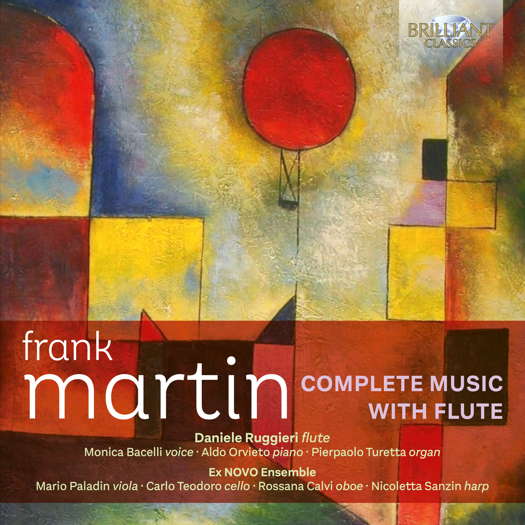 FEEDBACK: She said WHAT? Read what people think about our Classical Music Daily features, and have your say!
FEEDBACK: She said WHAT? Read what people think about our Classical Music Daily features, and have your say!
- Turnage
- Kirk Trevor
- electroacoustic music
- Charles Hoffer
- Paul Carey Jones
- Joropo
- Bliss: Metamorphic Variations
- Prague Symphony Orchestra
 SPONSORED: Ensemble. Melting Rhapsody - Malcolm Miller enjoys Jack Liebeck and Danny Driver's 'Hebrew Melody' recital, plus a recital by David Aaron Carpenter.
SPONSORED: Ensemble. Melting Rhapsody - Malcolm Miller enjoys Jack Liebeck and Danny Driver's 'Hebrew Melody' recital, plus a recital by David Aaron Carpenter.
All sponsored features >>

Frank Martin complete music with flute
97061 (Brilliant Classics, CD)
DDD
FIRST RELEASE (6 September 2024)
Playing time: 69'47"
Tracks: 14
Booklet pages: 9
℗ 2024 Brilliant Classics
© 2024 Brilliant Classics
Main country of recording: Italy
Country of manufacture: European Union
Reviewer: Geoff Pearce
Review of Frank Martin complete music with flute published on 25 September 2024
Daniele Ruggieri, flute
Monica Bacelli, voice
Aldo Orvieto, piano
Pierpaolo Turetta, organ
Ex NOVO Ensemble:
Mario Paladin, viola
Carlo Teodoro, cello
Rosanna Calvi, oboe
Nicoletta Sanzin, harp
Frank Martin:
1 Sonata da Chiesa (1941) for flute and organ
2 Deuxieme Ballade (1939) for flute and piano
3 Ballade for Flute and Piano (1939)
Quatre sonnets pour Cassandre (1921) for mezzo, flute, viola and cello
4 Qui voudra voir comme un dieu me surmonte
5 Nature ornant la dame qui devoyt
6 Avant le temps tes tempes fleuriront
7 Quand je te vois, seule, assise, à part toi
Trois Chants de Noël (1947) for voice, flute and piano
8 Les Cadeaux
9 Image de Noël
10 Les Bergers
11 Pièce brève (1957) for flute, oboe and harp
Drey Minnelieder (1961) for mezzo, flute, viola and cello
12 Ach herzeliep ...
13 Ez stuont ein frouwe alleine
14 Under den linden ...
A unique combination on record of chamber music by the Swiss composer, surveying the development of his voice and career through the medium of the flute. One of music's late starters, Frank Martin grew up as the tenth child of a Swiss pastor and his wife, surrounded by the music of Bach and Mozart. Only once Ernest Ansermet had founded the Orchestra de la Suisse Romande in 1918 did the twenty-eight-year-old Martin begin to discover and become captivated by the sensuality of Debussy and Ravel, and this stylistic dichotomy continued to play out in his own music. Among the most polished and individual of his early works is the set of four love-sonnets composed in 1921 to poems by the sixteenth-century balladeer Pierre de Ronsard. Already the influence of modernism is apparent on the angular and even ascetic shape of Martin's melodic invention, and yet a gentle, atmospheric mood pervades the cycle; this, too, would become a hallmark of his sound-world. In 1939, Martin began what would become a series of instrumental ballades with the competition piece which is still his best-known work for flute. In the same year, he followed it up with a Ballade for alto saxophone which he then arranged for flute; both works are fine examples of Martin's ability to reconcile serialism with tonality. A neoclassical (or rather, neo-Baroque) spirit infuses the Sonata da Chiesa of 1940 with solemn, Protestant gravity, yet the flute part still sings with the lyricism of the early Sonnets. From after the war, the Trois Chants de Noël (1947) distil the mystery of Christmas into three brief settings of texts by the Swiss poet Albert Rudhardt (1894-1944). A trio of Minnelieder (1961) masterfully strips Martin's language to the bone in a distinctive 'late style', where flute and guitar support and punctuate the sung line with an archaically flavoured modernity. Almost all these works have attracted no more than one or two recordings, but gathered together by these expert Italian musicians, they paint a new and compelling portrait of Frank Martin as a spiritually engaged modernist.
Recorded 23 November 2010 (live, tracks 4-7) and 20 September 2014 (live, tracks 8-10 and 12-14) at the Gran Teatro la Fenice – Sale Apollinee Venezia, Festival Ex Novo Musica, Italy, 12 June 2023 at Fazioli Concert Hall, Sacile, Italy (tracks 2, 3 and 11) and 13 June 2023 at St Stanislav's Chapel, Lubjana, Slovenia (track 1).

